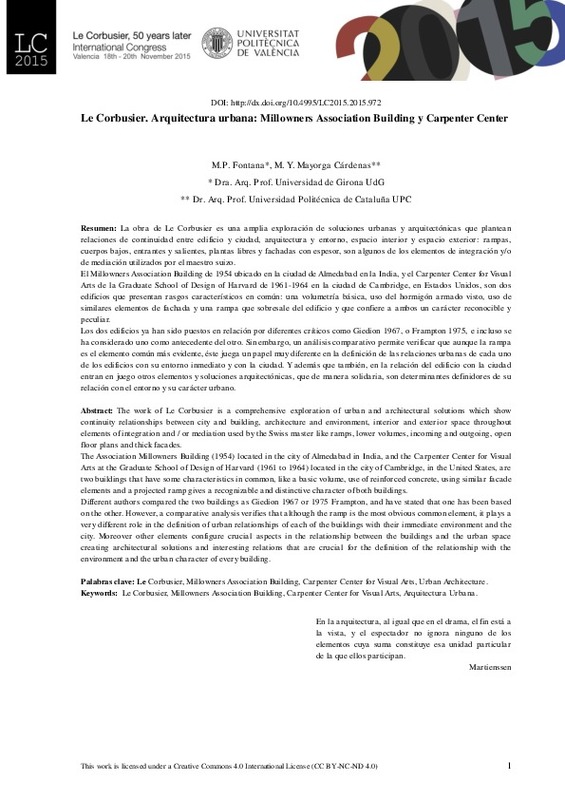|
Resumen:
|
[EN] The work of Le Corbusier is a comprehensive exploration of urban and architectural solutions which show
continuity relationships between city and building, architecture and environment, interior and exterior space ...[+]
[EN] The work of Le Corbusier is a comprehensive exploration of urban and architectural solutions which show
continuity relationships between city and building, architecture and environment, interior and exterior space throughout
elements of integration and / or mediation used by the Swiss master like ramps, lower volumes, incoming and outgoing, open
floor plans and thick facades.
The Association Millowners Building (1954) located in the city of Almedabad in India, and the Carpenter Center for Visual
Arts at the Graduate School of Design of Harvard (1961 to 1964) located in the city of Cambridge, in the United States, are
two buildings that have some characteristics in common, like a basic volume, use of reinforced concrete, using similar facade
elements and a projected ramp gives a recognizable and distinctive character of both buildings.
Different authors compared the two buildings as Giedion 1967 or 1975 Frampton, and have stated that one has been based
on the other. However, a comparative analysis verifies that although the ramp is the most obvious common element, it plays a
very different role in the definition of urban relationships of each of the buildings with their immediate environment and the
city. Moreover other elements configure crucial aspects in the relationship between the buildings and the urban space
creating architectural solutions and interesting relations that are crucial for the definition of the relationship with the
environment and the urban character of every building.
[-]
[ES] La obra de Le Corbusier es una amplia exploración de soluciones urbanas y arquitectónicas que plantean
relaciones de continuidad entre edificio y ciudad, arquitectura y entorno, espacio interior y espacio exterior: ...[+]
[ES] La obra de Le Corbusier es una amplia exploración de soluciones urbanas y arquitectónicas que plantean
relaciones de continuidad entre edificio y ciudad, arquitectura y entorno, espacio interior y espacio exterior: rampas,
cuerpos bajos, entrantes y salientes, plantas libres y fachadas con espesor, son algunos de los elementos de integración y/o
de mediación utilizados por el maestro suizo.
El Millowners Association Building de 1954 ubicado en la ciudad de Almedabad en la India, y el Carpenter Center for Visual
Arts de la Graduate School of Design of Harvard de 1961-1964 en la ciudad de Cambridge, en Estados Unidos, son dos
edificios que presentan rasgos característicos en común: una volumetría básica, uso del hormigón armado visto, uso de
similares elementos de fachada y una rampa que sobresale del edificio y que confiere a ambos un carácter reconocible y
peculiar.
Los dos edificios ya han sido puestos en relación por diferentes críticos como Giedion 1967, o Frampton 1975, e incluso se
ha considerado uno como antecedente del otro. Sin embargo, un análisis comparativo permite verificar que aunque la rampa
es el elemento común más evidente, éste juega un papel muy diferente en la definición de las relaciones urbanas de cada uno
de los edificios con su entorno inmediato y con la ciudad. Y además que también, en la relación del edificio con la ciudad
entran en juego otros elementos y soluciones arquitectónicas, que de manera solidaria, son determinantes definidores de su
relación con el entorno y su carácter urbano.
[-]
|








